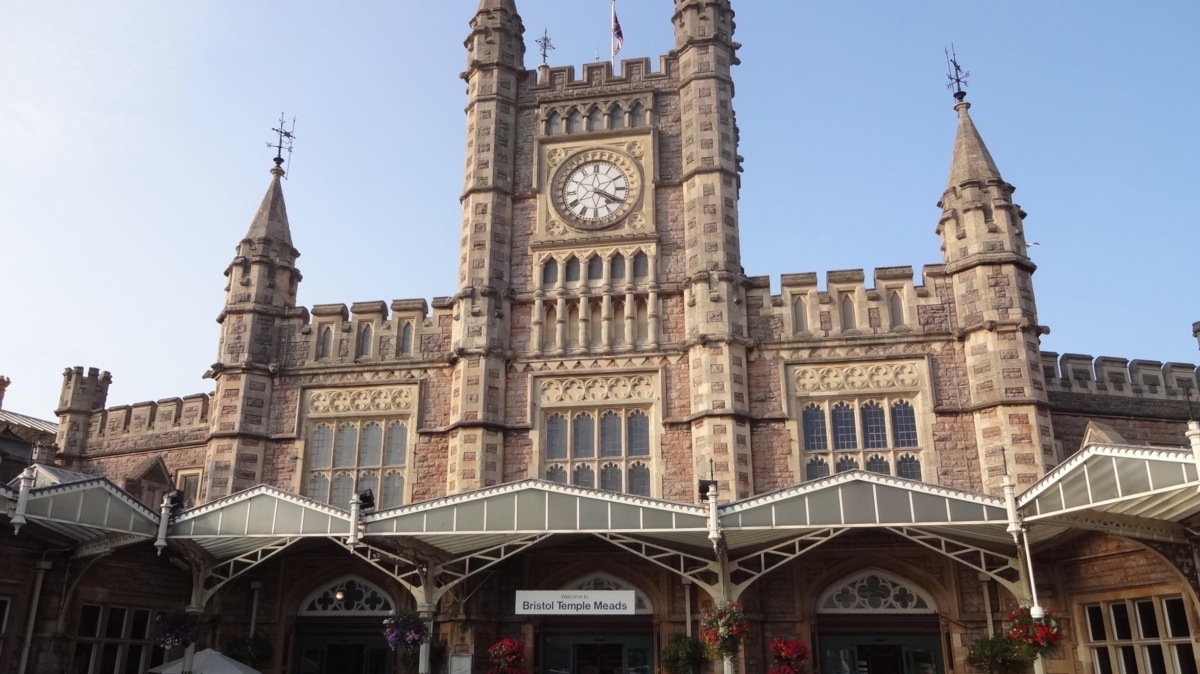Ahead of International Day of Disabled Persons (Saturday 3 December), Network Rail has teamed up with Bristol Sight Loss Council (BSLC) to launch a first-of-its-kind audio guide for Bristol Temple Meads station, to assist blind and partially sighted people with wayfinding.
Navigating Bristol Temple Meads for blind and partially sighted people has become more challenging since the start of Network Rail’s work to renovate the station’s historic train shed roof. Scaffolding towers have been erected in parts of the station and some areas have become one way only or temporarily closed for access.
To ensure Bristol Temple Meads remains as accessible as possible for all passengers, Network Rail has worked with BSLC to create an audio guide of the station. It’s the first time that such a tool has been made available at any Network Rail managed station.
The guide comprises 12 audio files, housed on a dedicated page on the Network Rail website and easily accessible from any personal device, such as a smartphone or tablet. Each file will guide the listener safely through a section of the station, making it far easier to navigate for blind and partially sighted people.
Network Rail’s aspiration is to continue working closely with BSLC and users of the audio guide to further improve this technology and ultimately roll out these kinds of guides more widely in other stations across the country.
Bernadette Sachse, Network Rail’s station manager for Bristol Temple Meads, said: “I’m so proud of the work we’ve done with Bristol Sight Loss Council to launch this audio guide, which will help to ensure that our station remains as accessible as possible for all passengers, especially during the roof works.
“We want everyone to feel welcome at our stations and are constantly looking to improve accessibility for people who experience disability. Alongside the audio guide, all our station signage has been designed in high contrast so that it can be more easily read. We install tactile paving on our platforms to improve safety and have ensured that Bristol Temple Meads can be easily navigated by those using a wheelchair.
“It’s been fantastic to work with the Sight Loss Council, who have tested the audio guide to make sure that it’s as user friendly as possible. I hope that this useful tool allows people to feel more confident in using our railway.”
Emma Hughes, director of services at Thomas Pocklington Trust, said: “Sight Loss Councils, led by blind and partially sighted members, work with businesses and service providers to improve the accessibility of services. They use their lived experience to create powerful change within our communities, working in partnership with others to create this change.
“We are proud of Bristol Sight Loss Council’s work with Bristol Temple Meads station to launch this first of its kind audio guide to help blind and partially sighted people to navigate the station. Everyone should be able to rely on accessible public transport and be able to travel independently and safely. We want to ensure all forms of transport are fully accessible to blind and partially sighted people across the country, enabling everyone to live the lives they want to lead in an independent way.
“We look forward to seeing what this powerful partnership can achieve together in the coming years.”
Coral Thomas, GWR accessibility mentor, said: “We are delighted to support the introduction of these audio guides at Bristol Temple Meads to assist customers who are visually impaired.
“GWR is passionate about making its trains and stations accessible to all. Bristol Temple Meads is undergoing some major refurbishments and anything that can be done to assist customers as they make their way through the station is a real positive.
“We look forward to receiving feedback from customers which may be of use as we seek to improve accessibility at stations across the GWR network.”
Councillor Don Alexander, Bristol City Council’s Cabinet Member for Transport, said: “I’d like to congratulate Network Rail, together with the Bristol Sight Loss Council, for developing this detailed audio guide. I hope it will be useful for blind and partially sighted visitors, helping them to travel independently to Bristol and beyond.”
Notes to Editors
Sight Loss Councils (SLC), funded by Thomas Pocklington Trust and led by blind and partially sighted volunteers, advocate the needs of blind and partially sighted people, and influence positive change.
There are currently 15 SLCs across the country. Each SLC is made up of around 10-12 blind and partially sighted members who meet monthly to discuss accessibility issues and plan projects in their regions under the three priority themes of Employment and Skills, Health and Social Care and Inclusive Communities. www.sightlosscouncils.org.uk
Over the next year Thomas Pocklington Trust will extend its SLCs further across the country. To find out more visit: www.sightlosscouncils.org.uk
To become a member, visit: www.sightlosscouncils.org.uk/become-a-member
